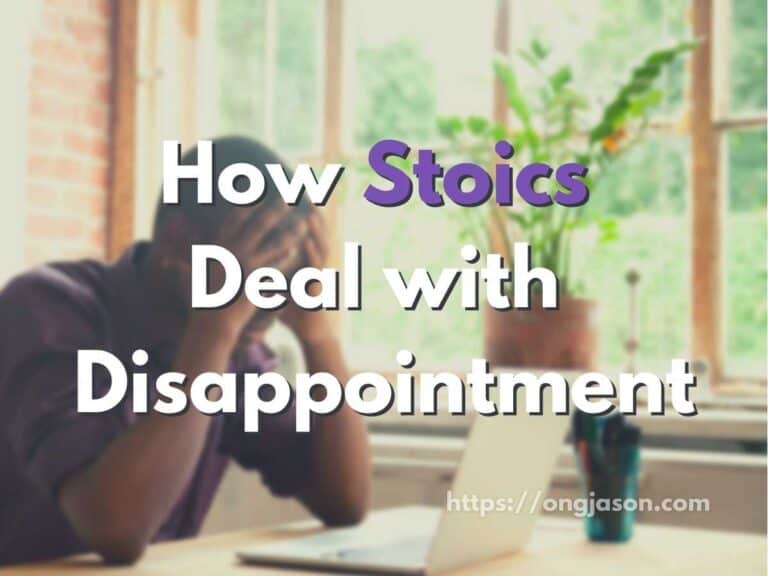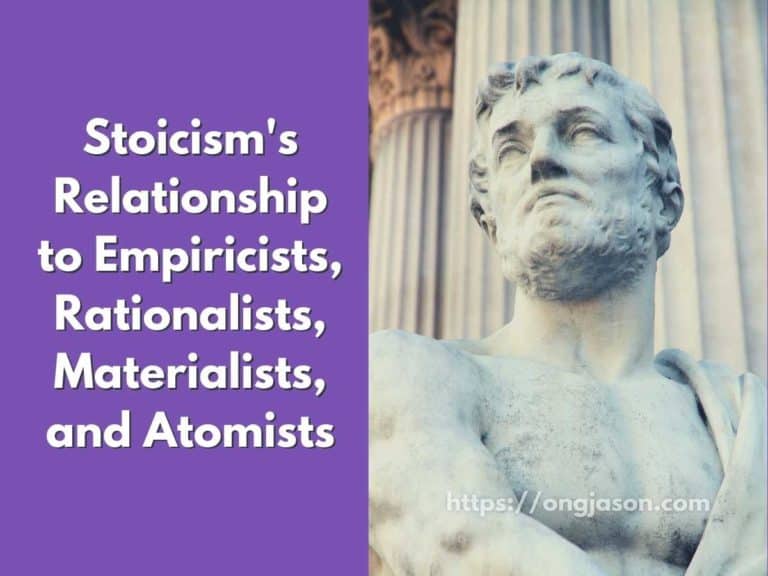9 Tips To Forgive Yourself as a Stoic | Stoicism and Recovery from Mistakes
I know how hard it is to deal with regrets. Sometimes, it can be hard to forgive ourselves because of the things we suddenly did. However, understand that Stoicism offers a variety of tips to help us. Thus, in this blog post, I would like to share some Stoic tips to help us forgive ourselves using Stoicism.
To forgive yourself as a Stoic, you first need to accept your mistake because it is the first step in solving it. After that, analyze the mistake and see if it is something within your control. If it’s not within your control, you should not mind them following the dichotomy of control. However, if it is within your control, try to solve the issue.
Now that I provided you with a summary, I will share 9 Stoic tips you can do to forgive yourself. These tips also helped me forgive myself, especially when in difficult times. Let’s start.

1. Become Aware of Your Mistake
If you’re reading this, you’re already aware of your mistake and would like to forgive yourself.
That’s good news considering you are trying to help yourself by gathering some tips.
The truth is, some people don’t even try to fix these problems, and I am happy you are trying to find ways to help yourself feel better.
Acknowledging your mistake is half the battle. We can’t solve the problem if we don’t know we have a problem.
Thus, becoming aware of your mistake is a good sign.
This is the first step to accepting forgiving yourself.
2. Accept That You Can’t Change the Past
In many aspects of Stoicism, the first step in dealing with anything is to accept.
Whether it may be emotions, mistakes, or guilt, the first step of handling anything, according to Stoics, is acceptance.
Acceptance is part of the three-step Stoic process, which are acceptance, examining, and doing.
Believe it or not, these nine tips will also follow the same process.
For more information regarding the three-step process, you may check my other blog post here: Stoicism and Emotions.
However, this time, we are going to the 2nd step, which is examining.
The Stoics believe in the dichotomy of control. The dichotomy of control means there are things we can and can’t control.
In that sense, we should only care about the things we can control.
Most of the time, our mistakes are outside our control. For one, the error already happened.
So, instead of forcing ourselves to do something about it, the Stoics believe we shouldn’t care about it any longer.
However, there are aspects of the mistake we can change. Thus, following the dichotomy of control, we should focus on those aspects.
First, understand and accept that we can’t change the past. No matter what we do, the mistakes have already happened. So instead, we can act now to prevent it from happening again in the future.
Remember that acceptance is forgiveness, and forgiveness is freedom.
If you want to be free, you need to forgive yourself.
If the mistake is something outside your control, Stoicism tells us we should let them go.
“Freedom is the only worthy goal in life. It is won by disregarding things that lie beyond our control.”
― Epictetus
However, how can we be free? How can we apologize for both ourselves and the person we did wrong? So let’s go to the next section.
3. Silence your Ego and Apologize
Generally speaking, what prevents us from apologizing, whether it may be ourselves or others, is our ego.
The Stoics believe that ego can prevent us from doing the right thing.
In the case of mistakes, some mistakes can be solved by an apology. However, our ego prevents us from doing so.
So, take a deep breath, and apologize. Understand that we aren’t perfect, and we make mistakes.
In this sense, we should apologize since we are hard on ourselves.
A Stoic should always keep their ego in check since it is prone to overact.
Sometimes, by lessening our ego, we can instantly forgive ourselves.
Only by that will we achieve freedom and forgive ourselves for our mistakes in the past.
What if we can’t control our egos? I know how hard it can be to force ourselves into saying sorry.
Well, let’s go to the next tip.
4. Listen to Your Conscience
An excellent way to keep our ego in check is by using our conscience.
The Stoics believe that our conscience can serve as a guide to drive our actions. These actions include controlling our egos.
If we do something wrong, we know it is wrong because of our conscience.
Listening to our conscience is an excellent way to keep our ego in check. While our ego keeps us from doing the right thing, our conscience helps us do the right thing.
The fact that you are reading this post means your conscience is finding a way to forgive yourself.
Maybe, you are too hard on yourself. But, since we can’t change the past, we should only care for what we can change.
Only by letting go of your past mistakes can you focus on your present and hope for a better future.
However, I understand how hard it is to let go of the past completely. I know, and that’s not what I mean by letting go of the past.
Since we can’t help but get something from our past, we should at least get the right things for the past.
Gladly, Stoicism offers a way for us to get the right things from our past mistakes.
5. See the Mistake as a Learning Opportunity
The Stoics believe that mistakes can serve as a learning opportunity.
Indeed, we did wrong. Unfortunately, what we can’t do is erase the past. However, what we can do is to prevent ourselves from making the same mistakes.
By doing our best not to make the same mistake, we can easily forgive ourselves.
That way, even if it is hard to forgive yourself for your mistake, the act of trying not to let it happen again can help us to be free from guilt finally.
For the Stoics, this is one of the few things you should take from your past. If you can’t help but take something from the past, let it be the mistakes that serve as lessons.
That way, forgiving yourself will be easier.
Now that you know what you could do to forgive yourself let’s look at what you shouldn’t do.
6. Do Not Punish Yourself
The Stoics believe in forgiveness, and the opposite of forgiveness is revenge.
Punishing yourself is a form of revenge. It is revenge on yourself. It is inflicting harm because of guilt.
Forgiveness, according to Stoics, is a form of healing. It helps you feel better after some mistakes. That’s why many Stoic philosophers are very keen on forgiving both themselves and others.
The opposite of this is revenge. While forgiving is a form of healing, revenge is a form of harming yourself.
Do not punish yourself because of a mistake. Remember that everybody makes.
7. Do Not Make the Situation Worse
There are times where people make the situation worse, which is entirely illogical.
Remember that Stoics believe in being rational. Therefore, they try to stay logical in handling things in life.
However, what other people do is since they can’t forgive themselves, they just continue making the same mistake since they already did it.
For example, just because you made a mistake in your diet doesn’t mean you should order a buffet meal since you already made a mistake.
These acts are illogical, and Stoics stay away from these acts.
Instead, try to analyze the problem. Why you failed, and what you can do to prevent making the same mistake again.
There are many examples of making things worse, like when dealing with breakups.
If you’re interested in how the Stoics deal with breakups, please check this blog post: Stoic ways in coping with breakups.
8. Hope for a Better Future
People usually say that to be happy, live only in the present.
What I like about Stoicism is it talks about living in the present while hoping for the future.
It is possible to live in the present while hoping for a better future, and you can use this in forgiving yourself.
By having hope, it can be easier to forgive ourselves.
Hoping gives us a lighter mood. This lighter mood can help us finally forgive ourselves for what we have done in the past.
So don’t lose hope. In fact, not having hope is one of the common causes of not forgiving yourself for your mistakes.
At least, if we want to make it easier for us to forgive ourselves, we should have hope for the things we could accomplish in the future.
9. Choose Freedom
Finally, choose freedom.
Remember that forgiving yourself causes us to feel free.
It may be free from our limiting beliefs or our mistakes. But, whatever it is, freedom is the ultimate outcome of forgiving ourselves.
Think of freedom as the target. It is easier to reach the target if you know what it is.
It is like driving where it is easier for you to reach the destination if you know where you’ll be going.
By always choosing freedom, it will be easier for us to forgive ourselves.
What’s next? You can find more about Stoicism and Forgiveness in a separate blog post. This time, this blog post is focused on forgiving others rather than forgiving yourself. Here is the link if you’re interested: Stoicism and Forgiveness: What the Stoics say about forgiving others?

“Only the things I love.“
ongjason.com is reader-supported. When you buy through links on the site, I earn an affiliate commission.
If you’re following me, you’ll know that I believe it is essential to have some tools, whether it’s for personal development or lifestyle in general.
So, here are the things I love.
YouTube
If you want to learn things for free, I recommend watching my YouTube Channel. Click the Button Below to go straight into my Channel. 🙂
Okay, let me first explain my Channel.
I believe that I really can’t explain everything too well on my blog. That’s why I created a YouTube Channel so I can easily explain a lot of things. Plus, I believe that Video Sharing is the future.
Recommended Books
The next thing is books. Books are, for me, one of the cheapest ways to get invaluable information. We can learn personal development, finance, career, relationships, and many more from books.
Here, I will be listing my favorite books in different categories.
- For Beginners – 7 Habits of Highly Effective People by Stephen Covey – Personal development has a lot of concepts and ideas to learn. Thus it can be really hard for beginners to know where to start. Thus, I recommend this book since all the basic concepts of personal development are here(except finance, check what I recommended for that)
- Productivity – The One Thing by Gary Keller – This book teaches us the power of focusing on one thing which is the ultimate source of productivity. The concepts taught are what I am using to constantly publish YouTube videos while maintaining this website.
- Busy? – Make Time by Jack Knapp – This book teaches us how to make time for the things we love. The concept is really simple but I think that makes it a book worth reading.
- Health – Lifespan by Dr.Sinclair – This Book teaches about the latest scientific research on lifespan. In his book, he has shared numerous things he is doing to slow down his aging process. This can be as easy as eating less which he recommends.
- Finance – The Richest Man in Babylon by George Clason – Perhaps one of the first books I’ve read about Finance, this book for me is the best if we are talking about learning basic finance such as basic saving and investing. The concepts are very simple but effective.
Audiobooks
Take this advice as a grain of salt.
I don’t recommend buying Audiobooks one by one. I mean, audiobooks can be quickly finished by listening while working out or doing some mindless tasks.
So here is to save you some money. Just go for a monthly subscription to Audible. I believe that you will save a lot of money with that plus, they usually give freebies to anyone starting.
My Audiobook Recommendation will always be the same as my book recommendations, but I personally like The 5 Second Rule by Mel Robbins. I like how she is so casual while reading her book.






